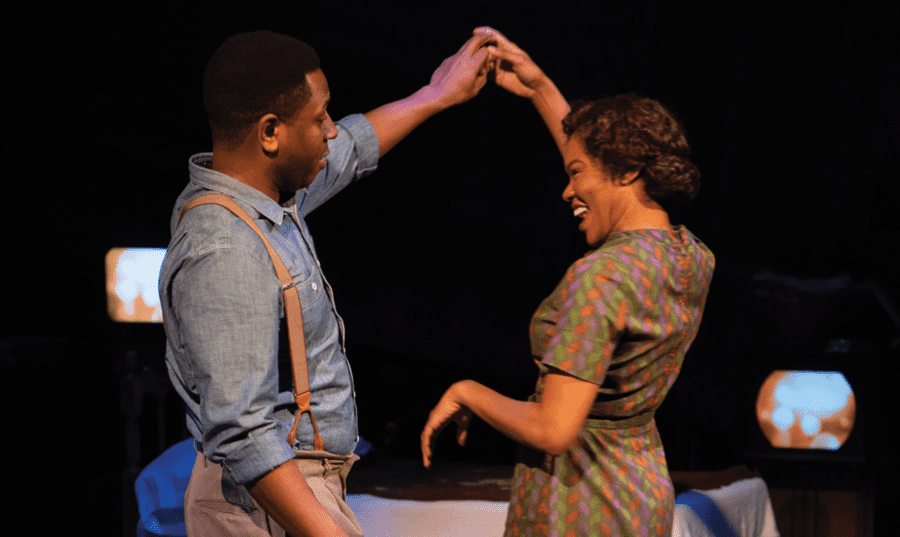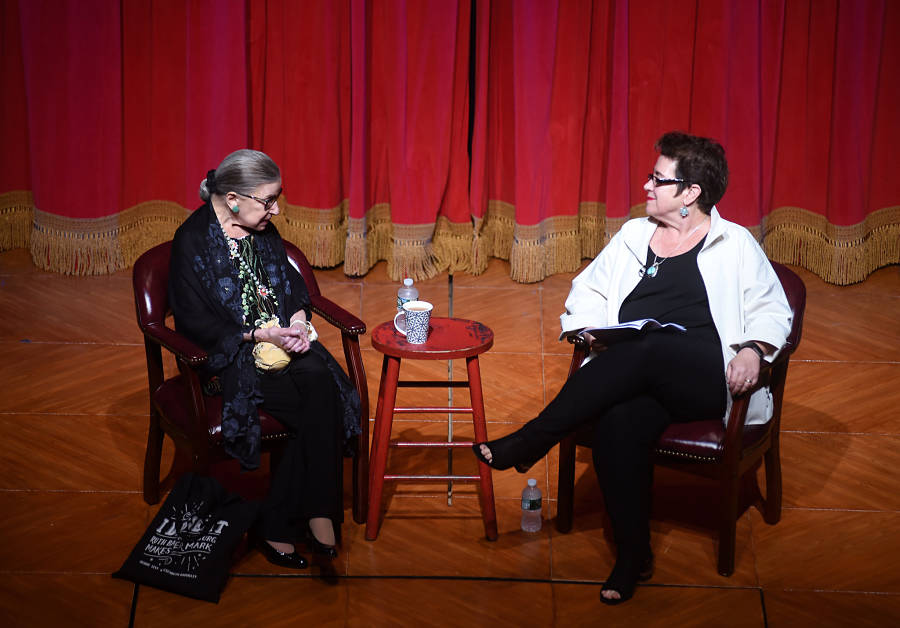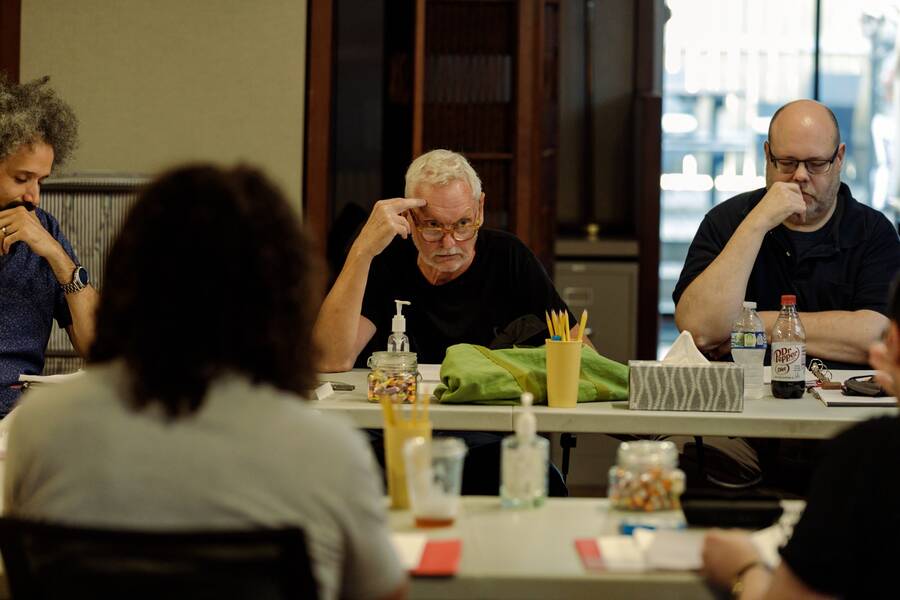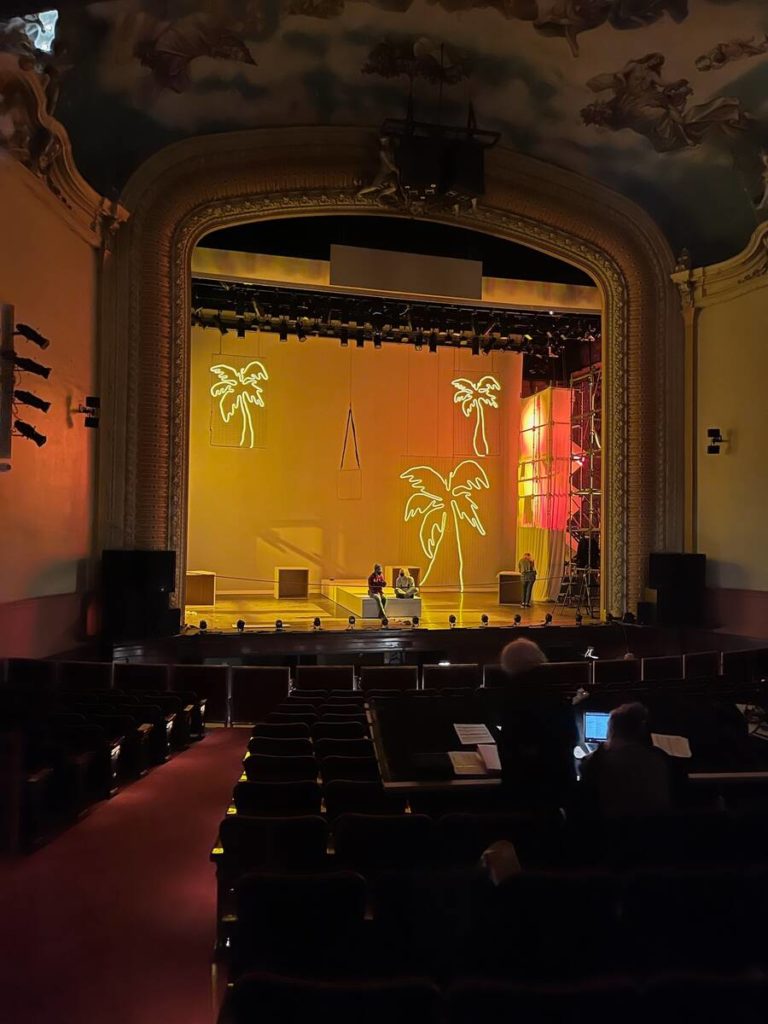The fall theatre plate is full and I’m still at the buffet, seeing a lot more I’d like a bite of. This week I’ll inaugurate a more quick-hit version of this column, based in part on a running list I’ve kept as I’ve updated these season listings and noticed shows that piqued my interest, and based in part on other projects I’ve been trying to keep an eye on, all of which I would make a point to personally see if distance weren’t an obstacle. Each of these productions might merit their own piece, but this will have to do for now. Tucking in…
Now at Road Less Traveled Productions in Buffalo is a production of Michael Mitnick’s Mysterious Circumstances (through Oct. 16). While Ken Ludwig and a few others have written plays spinning off of Sherlock Holmes (The Game’s Afoot, about the stage actor who made his name playing Holmes, William Gillette, and Baskerville, a sort of 39 Steps-style romp), this one is something a bit weirder and more bespoke. Mitnick’s play is inspired by a riveting, labyrinthine 2004 New Yorker article by David Grann about Richard Lancelyn Green, an Sir Arthur Conan Doyle researcher who was on the verge of a major discovery—a long-missing trove of the author’s papers that might have cracked several mysteries about Conan Doyle’s life and work—when he turned up dead under, well, mysterious circumstances. Mitnick—a deft comic writer I met years ago when we were both in the BMI Lehman Engel Musical Theatre Workshop, and whose other plays include The Siegel, Ed, Downloaded, and the Macbeth-riffing musical Scotland, PA—takes the Grann story as a jumping-off point for a play about an intensely competitive, possibly even murderous, nerd culture. He also, based on what I’ve read in reviews of its 2019 premiere at L.A.’s Geffen Playhouse, takes the story to one of its logical conclusions: If, as many have commented, the death of Green is the kind of mystery only Holmes and Watson could possibly unravel, Mitnick interpolates the crime-solving duo into his own play. Here’s hoping Mysterious Circumstances gets to a stage where I can catch it.

Ifa Bayeza didn’t just write one play about the shameful 1955 murder of 14-year-old Emmett Till, she wrote three, and Washington, D.C.’s Mosaic Theatre is staging them all with their ambitious The Till Trilogy (Oct. 4-Nov. 20), directed by Talvin Wilks and performed in rotating repertory by 10 actors. The three plays include Bayeza’s well-known The Ballad of Emmett Till, which premiered in 2008 at the Goodman Theatre; Benevolence, which bowed in 2019 at the Penumbra; and That Summer in Sumner, in its world premiere at the Mosaic. The first of these is a music-infused telling of Till’s murder by two white men who believed he had flirted with a white woman, Carolyn Bryant; the third is a courtroom drama about the trial of his murderers, who were acquitted; while Benevolence, the third in the chronological timeline but not Bayeza’s newest play, follows two couples, one Black and one white, as they navigate the ripple effects of the Till murder in their lives. As this Washington City Paper article makes clear, these plays are just part of a “sprawling series of free events dedicated to honoring Till’s legacy, with discussions and readings taking place in museums, community centers, and libraries across the D.C. metro area,” and they spring from the leadership of Mosaic’s new artistic director, Reginald Douglas, who intends to “strengthen local ties and draw audiences into a pivotal moment in American Civil Rights history—one that Bayeza has described, unabashedly, as the stuff of myth and epic.” It’s also the stuff of recent real-life headlines: As recently as August, a Mississippi grand jury declined to indict Bryant on charges of kidnapping and murder, of which her husband and his brother were acquitted at the original trial. Bryant is 88; Emmett Till would be 81 had he not been lynched.

Rupert Holmes—yes, the “Piña Colada Song” guy, but also the Mystery of Edwin Drood guy—has a new play kicking off a 16-city tour this week, and it’s not a mystery or a romance but All Things Equal–The Life and Trials of Ruth Bader Ginsburg, billed as “an intimate portrayal” of the late Supreme Court Justice. The 90-minute one-woman show, starring Michelle Azar and directed by Laley Lippard, sounds a bit like Holland Taylor’s Ann: The premise is that RBG has invited a friend to her chambers to convey “a sense of her life and its many trials,” as you do. It kicks off Oct. 5 at freeFall Theatre Company in St. Petersburg, Fla. (spared the ravages of Hurricane Ian, in case you’re wondering), and will be at Sag Harbor, N.Y.’s Bay Street Theater in November, before ranging between now and next May from D.C. to Phoenix, Atlanta to Elvira, Ohio, and many points in between (though not Ginbsurg’s native Brooklyn, alas). And though it’s not a musical, a quote from Holmes promises that the play “also reveals the love song that ran through her remarkable life and shares the music that was her giddy delight.” (We also know that she, like her unlikely Supreme Court pal Antonin Scalia, also loved the theatre, and has been the subject of a stage play at least once before.)

The title alone drew me to this next one. Opening this week at Chicago’s A Red Orchid Theatre is The Malignant Ampersands (Oct. 6-Nov. 27). It seems to be exactly what it sounds like: A not-at-all reverent take on Orson Welles’s damaged 1942 masterpiece The Magnificent Ambersons, itself based on Booth Tarkington’s novel about a rich, complicated Midwestern family. But this is no late-night cinema roast: As this New City Stage article details, writer Brett Neveu has instead used the Tarkington/Welles chassis to build an entirely new vehicle, imagining a dissolute contemporary family comprising six members, all afflicted in some way or other with cancer, as they shuffle between doctors’ offices and worry over their health. Oh, and it’s in verse. Stay weird, Chicago.

I’ve never been to Alaska but I can’t imagine a better introduction to the state and its culture than Where the Summit Meets the Stars, written and directed by Frank Henry Kaash Katasse and starting performances at Perseverance Theatre in Juneau on Oct. 5. It’s billed as “an ethereal Alaska Native story driven by music, dance, and the culture of the Tlingit people,” following the story of a woman, Rose, rescued from a near-death experience by a mysterious stranger. Developed at Native Voices at the Autry and at La Jolla Playhouse, it’s a play that Perseverance has been hoping to bring to its stage since before the pandemic, and now it’s finally here. The highly quotable playwright speaks for us all when he says in this article: “There’s nothing like the excitement of being in the theatre on opening night. Every once in a while you’ll get a zap of zen when you’re working on these plays. It feels like the first time you’re hearing other people say your words or hearing people discussing your play, and you’re like, ‘Wow they really care about this!’ I think just being there and experiencing something with them and sharing the same heartbeat and perspective as an audience member, it’s something magical. It’s a very human thing.”

I’ve been fascinated by Pittsburgh’s Quantum Theatre ever since we did one of our first Know a Theatre features on them in 2014, and it shouldn’t be hard to figure out why: Since 1990, they have been staging avant-garde plays and operas at various unlikely sites around the City of Bridges. I finally had the chance, not to see a production, alas, but to meet founding artistic director Karla Boos at the TCG conference in June in Pittsburgh, where she and her executive director, Erick Hoffman, tipped me to the troupe’s next big venture: The world premiere of a new version of Idaspe, Riccardo Broschi’s 18th-century opera, with modern notation and a thoroughly updated staging by composer Claire van Kampen and Chatham Baroque. Van Kampen is best known stateside for the operatic drama Farinelli and the King, which hit Broadway starring her husband, Mark Rylance in 2017, and there’s a Farinelli connection to this new work as well: Mezzo-soprano Vivica Genaux will be singing the role of Dario, originally written by Broschi for his brother, Farinelli, the famed castrato who, according to van Kampen’s play as well as popular lore, had the fateful operation ordered by his composer brother. None of that backstory is part of Idaspe, though van Kampen’s contemporary update—she’s set it in 1960s Naples, among Middle Eastern refugees who become entangled in a local organized crime network—is likely to evoke not only contemporary parallels to the Europe’s current refugee crisis but resonances with the intrigues and inequities of 18th-century Naples. Above all, the piece marries Van Kampen’s and Quantum’s shared desire to bring opera back to the theatre, as the composer explains in this brief video. (Indeed, in a slight departure from previous practice, Quantum will stage Idaspe not in a warehouse or a museum but at the landmark Byham Theatre.)

Finally, as part of an unsurprisingly exciting 2022-23 season, Chicago’s Steppenwolf will finally premiere 1919, a stage adaptation by J. Nicole Brooks of Eve L. Ewing’s searing book of poems about the Chicago race riots of the title year, which left 17-year-old Eugene Williams dead. (The show, meant to inaugurate Steppenwolf’s new theatre in February, was postponed due to a COVID surge; now in previews, the new run has its opening night Oct. 10 and runs through Oct. 29.) Though it’s a production of Steppenwolf for Young Adults, I wouldn’t miss this one were I in Chicago, and there would be plenty of chances, either in its run at Steppenwolf or at one of the five Chicago locations it will tour to in November. Said Ewing (formerly Twitter’s beloved wikipedia brown) in a statement, “It feels surreal to know that this little book and the stories I tried to capture will find a new home on the stage, thanks to the incredible work of such an impressive and interdisciplinary group of artists. I can’t wait for Chicagoans to have the opportunity to reflect on the events of the Red Summer in this new way, and as an educator I’m especially inspired and humbled to know that so many young people will have the chance to experience the production.”
Count me inspired too, by the variety and abundance on display across U.S. theatres, even the ones I can’t experience firsthand.
Rob Weinert-Kendt (he/him) is the editor-in-chief of American Theatre.


